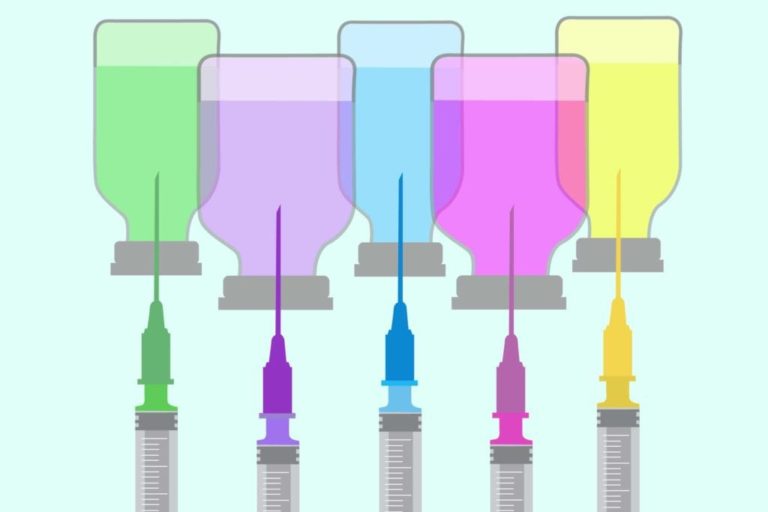Enhancing Adult Vaccine Uptake: Challenges in Shared Clinical Decision Making and Risk-Based Recommendations
The Future of Vaccine Research: How It’s Shaping Your Health
The Future of Vaccine Research: How It’s Shaping Your Health
Discover how new vaccine advancements can protect your health and your loved ones.
October 25, 2024
GHLF STAFF

Vaccines have always played a huge role in keeping us healthy, protecting us from dangerous diseases like measles, the flu, and more recently, COVID-19. But did you know that vaccine research is constantly evolving? New discoveries and technologies are paving the way for better, more effective vaccines — ones that can protect not just against infectious diseases, but also help people living with chronic conditions.
Vaccine experts are working to create these innovative vaccines, ensuring that we stay ahead of the curve in preventing illness. In this article, we’ll explore the latest in vaccine research and how these advancements could impact your health.
Why Vaccines Matter More Than Ever
Before diving into the science, it’s important to remember just how vital vaccines are. They protect us by training our immune system to fight off diseases without us having to get sick first.
“Vaccines have really transformed the health of the world. Vaccines aren’t just for children anymore. We now see increasing importance of adult vaccination,” says Dr. Philip Dormitzer, Senior Vice President and Global Head of Vaccines R&D and Infectious Disease Research.
With this in mind, let’s look at some of the exciting advancements happening in vaccine research today.
Breakthroughs in Vaccine Technology
One of the most significant changes in recent years has been the rise of mRNA vaccines. You might know them from their role in fighting COVID-19, but scientists have been studying mRNA for many years to treat other diseases.
“mRNA vaccines are a game changer,” says Dr. Dormitzer. “They allow us to quickly adapt and create vaccines when new viruses appear.” This flexibility means that mRNA technology could be used to update vaccines for other viruses, like the flu, making it easier to protect against new strains each year.
Another breakthrough has been the development of the RSV vaccine. RSV (respiratory syncytial virus) is a virus that can cause serious lung problems, especially in older adults. For years, scientists struggled to create an RSV vaccine, but a recent discovery about the virus’s structure finally made it possible.
“It was a scientific breakthrough that allowed us to understand how to stabilize the spike protein of RSV, leading to an effective vaccine,” explains Dr. Dormitzer.
Beyond Viruses: Vaccines Targeting Bacteria
Vaccines aren’t just for viruses — they can protect us from bacterial infections too. This is especially important because bacterial infections can be harder to treat and prevent.
“Bacteria are different from viruses — they have carbohydrates on their outer layer. By targeting these, we can neutralize the bacteria and prevent infection,” says Dr. Jamila Louahed, who leads Global R&D for Therapeutic Vaccines and is the Belgium R&D Site Head at GSK Vaccines.
This could lead to more vaccines targeting bacterial infections such as streptococci infection, which have been difficult to prevent in the past.
Vaccines for People with Chronic Conditions
Vaccines play a critical role in protecting people with chronic health conditions. Those with heart disease, lung disease, or weakened immune systems, for example, are at a higher risk of getting very sick from infections like the flu or pneumonia. “People do not value existing vaccines for chronic conditions. And they usually don’t think about having preventative vaccine that could help [with] their comorbidity status,” emphasizes Dr. Louahed.
Dr. Dormitzer adds that vaccines can also help manage the long-term effects of some infections. One example is the shingles vaccine. Shingles is caused by the varicella-zoster virus (the same virus that causes chickenpox), which stays in your body even after you recover from chickenpox. “Even if someone has already been infected with the virus, getting vaccinated can prevent shingles and the long-term nerve pain that sometimes follows,” says Dr. Dormitzer.
What’s Next in Vaccine Research?
Looking ahead, the future of vaccines is bright. Dr. Dormitzer says that mRNA technology could be used to make flu vaccines faster and more effective. “We’ve seen how quickly mRNA vaccines can be developed and updated. This could help us respond faster to changes in the flu virus,” he explains.
Dr. Louahed is also excited about the possibility of combination vaccines, which could protect against several diseases at once. “We’re working on vaccines that offer long-lasting protection, so people don’t need booster shots as often. Combination vaccines could make it easier for people to stay up-to-date on their vaccinations,” she says.
Another promising area of research involves using vaccines to target chronic diseases themselves. Dr. Louahed points out that some vaccines, like the HPV vaccine, may even eventually prevent certain cancers. “Vaccines aren’t just about preventing infections anymore. We’re now looking at how vaccines can prevent chronic diseases, like cancer, and improve overall health,” she explains.
Additionally, there have been a number of observational studies that have seen an association between immunization against the varicella-zoster virus, specifically shingles vaccination, and lower rates of dementia. “What we don’t know, is if that’s a causal association or not,” explains Dr. Dormitzer. “At this point, the reason to take a shingles vaccine is to prevent shingles. We will determine, through additional study, whether the association that has been observed between taking a shingles vaccine and a lower risk, or delayed dementia, is causal or not.”
Where to Find Reliable Information
With so much changing in the world of vaccines, it’s important to get your information from trusted sources. Dr. Dormitzer recommends talking to your doctor and visiting reputable websites like the Centers for Disease Control and Prevention (CDC) and the World Health Organization (WHO).
“There’s a lot of information out there, and not all of it is accurate. Having a reliable source, like your doctor, can help you make the best decisions for your health,” he says.
Staying Protected with Vaccines
Vaccines have always been an essential part of staying healthy, but today they’re more powerful than ever. Thanks to new technologies like mRNA and combination vaccines, we can protect ourselves better and more efficiently. Whether it’s preventing the flu, shingles, or even chronic diseases like cancer, vaccines are a crucial tool for maintaining your health.
“People sometimes forget the value of vaccines because they’ve been so successful,” notes Dr. Louahed. “But there’s no better way to prevent disease than through vaccination.”
Staying informed and talking to your health care provider can help you make the best decisions about your health and be part of a healthier future for everyone.
Informed Immunity
Informed Immunity is a podcast series dedicated to providing clear, evidence-based information on vaccines and public health. Our episodes cover important topics like vaccine equity, debunking myths, and the latest advancements in research. Listen now to empower yourself with the knowledge you need to make informed health decisions.
This article was made possible with support from GSK.
SUBSCRIBE TO GHLF
RELATED POST AND PAGES
_
Was this article helpful?
YesNo






